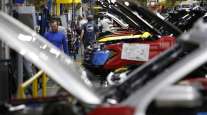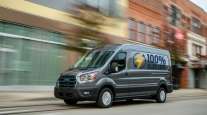Ford Plans $900 Million Bet on Michigan-Made Autos of Future
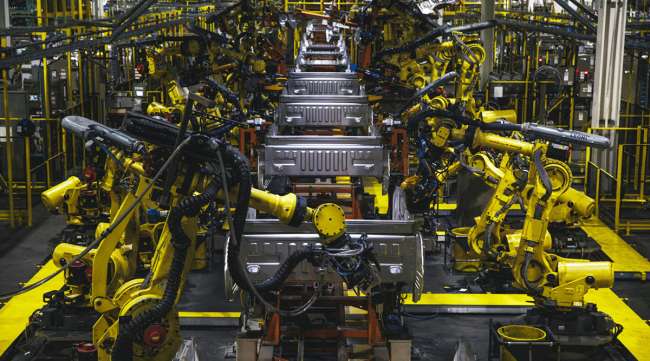
Ford Motor Co. plans to spend about $900 million and hire about 900 workers to build electric and self-driving vehicles in Michigan, while moving production of a small commercial van to Mexico from Europe.
The moves, announced the same day Donald Trump visited an Ohio tank plant, follows the president’s sharp criticism of General Motors Co. for idling a car factory in Lordstown, Ohio. Ford is reiterating some previous financial and employment commitments while changing gears for the third time on building electric autos at an underutilized factory south of Detroit.
Roughly a year and a half after shifting production of a future electric sport utility vehicle to Mexico from Flat Rock, Mich., Ford says it now plans to build other battery-powered models there and add a second shift of workers by 2023, at a cost of $850 million. The automaker also is spending $50 million to establish a facility near Detroit where workers will add self-driving software to autonomous vehicles that will be built elsewhere. The Flat Rock factory will continue to produce the Mustang sports car and Lincoln Continental sedan.
“When we stepped back and looked at our plans for the future with battery-electric vehicles and electrification in general and the commitment to $11 billion in investment, it was very clear to us over the last year or so that we were going to need a second plant,” Joe Hinrichs, Ford’s president of global operations, said in an interview. “It became pretty clear to us that Flat Rock was the right plant to have that capacity. It has a lot of experience building multiple different things.”
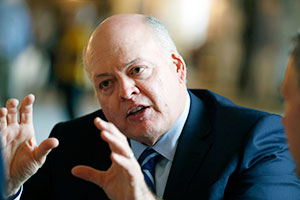
Ford CEO Jim Hackett (Jeff Kowalsky/Bloomberg News)
Ford shares fell as much as 2.5% and were down 1.6% to $8.56 March 20 in New York. The stock is up about 12% this year.
CEO Jim Hackett is leading an $11 billion overhaul of Ford, which saw net income fall by more than half last year. The restructuring will involve cutting thousands of salaried jobs and closing factories in unprofitable overseas operations.
Ford is shifting production of its Transit Connect compact commercial van from Spain to a factory in Hermosillo, Mexico, that’s been producing the Fusion sedan. Hinrichs said he doesn’t expect the move to have any impact on a U.S. Customs case in which Ford has been accused of “tariff engineering.”
Hinrichs said Ford had informed U.S. and Michigan government officials about the investments, but he declined to directly address Trump’s recent criticisms of GM.
“We’re just proud of our presence here in the U.S.,” Hinrichs said.
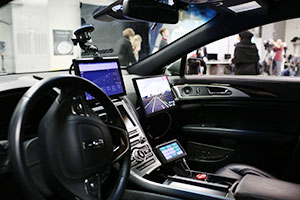
A Lincoln Navigator equipped with self-driving technology. (David Kawai/Bloomberg News)
Ford has wavered with its plans for the Flat Rock plant several times over the course of just a few years. As Trump was taking office in January 2017, then-CEO Mark Fields announced the factory would build both self-driving cars and the electric SUV.
Fields was ousted four months later. In December 2017, his successor Hackett said the electric SUV would instead be built in Mexico, citing the need for more capacity in Flat Rock to build autonomous vehicles. The announcement March 20 suggests Ford might not need as much capacity for self-driving cars, since it no longer plans to produce them in Flat Rock as it makes way for electric vehicles at the factory.
Hinrichs denied that Ford is dialing back its autonomous plans.
“Nothing has changed with our volume plans or our commitment to the technology launching in 2021,” Hinrichs said. “But also, in the name of fitness, we were evaluating all of our capital expenditures, so it became clear to us that we could do a less capital-intensive way of manufacturing for the first few years of AVs.”
Hinrichs also dropped a hint on Ford’s plan to arrange for the supply of batteries to power its new electric vehicles. The company will procure them locally, he said, while declining to discuss in detail whether shifting to plug-in cars will hurt employment at powertrain factories.
“Our batteries will be sourced here in North America,” Hinrichs said. “Certainly, we’re all watching what’s happening with internal combustion engine capacity over time, and those are things we’ll work together with our UAW partners on to do the right thing for our people and for our business.”


